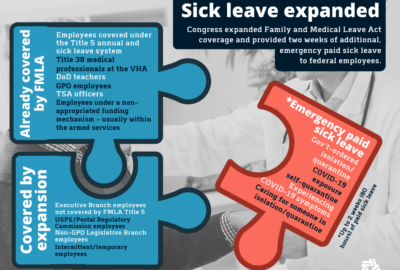
Unions still see problems with emergency paid sick leave at SSA, VA
Unions have filed grievances with both the Social Security Administration and the Department of Veterans Affairs over their implementation of the emergency paid...
Federal unions are fighting the workaround procedures the Social Security Administration has put in place to allow employees to manually request emergency paid sick leave during the ongoing pandemic.
Under the Emergency Paid Sick Leave Act (EPSLA), all federal employees were eligible for up to 80 hours of emergency paid sick leave starting April 1 — as long as they meet certain coronavirus-related circumstances.
But with the payroll codes needed to request and correctly calculate leave payments still unavailable, SSA informed employees in late May of new procedures that would allow them to request emergency paid sick leave via paper.
To request the leave, SSA employees must fill out a waiver and designate the reason for which they need it. Federal employees must meet one of six requirements to take the new leave, though certain reasons will only qualify them for two-thirds of their normal pay.
By signing the waiver, SSA employees acknowledge they may initially be overpaid for EPSLA, and the agency will not waive the overpayments.
Multiple SSA unions, however, say this approach is problematic, because it sets up pre-conditions for employees to use the emergency paid sick leave benefits. The conditions, the unions said in a grievance with the agency, are a workaround for the ongoing complications with payroll and time and attendance systems — challenges that are ultimately beyond employees’ control.
“The administration’s failure to implement the CARES Act timely intentionally cause bargaining unit employees to incur debts that are required to be repaid to the SSA, which unlawfully discourages bargaining unit employee participation in the emergency sick leave program,” said the American Federation of Government Employees Council 220 in its grievance.
AFGE Council 220 represents SSA employees at the agency’s field offices and tele-service centers.
Resolving an overpayment is often a long, complex process for both the employee and the agency, said Rich Couture, president of AFGE Council 215, which also represents SSA workers. He feared SSA employees would see the word “overpayment” on the EPSLA request form and become discouraged from using the congressionally-mandated benefits.
“I do understand SSA doesn’t administer its own payroll,” he said. “But SSA as an employer has a responsibility to comply with the law.”
SSA didn’t respond to multiple requests for comment about the unions’ grievances or to questions about the agency’s anticipated timeline for completing the necessary changes to its timekeeping and payroll systems.
The Interior Business Center, SSA’s payroll provider, last told Federal News Network in May all of its customers can use EPSLA, though agencies must use an interim process to properly code employees’ time sheets to account for the leave.
The National Treasury Employees Union, which represents decision writers, legal assistants and attorneys at SSA’s Office of Hearing Operations (OHO), told Federal News Network last month the proper payroll codes for emergency paid sick leave may not be ready until July.
Federal payroll providers struggle to make pay, leave changes quickly
Congress passed the Families First Coronavirus Response Act, which included the emergency paid sick leave program, on March 18, just a week after members had introduced it in the House. The law gave the Labor Department exactly two weeks to write the regulations necessary to implement the emergency paid sick leave program.
Congress will often consult with the agencies charged with implementing a potential law before final passage to give them advance notice.
But it’s highly unlikely agencies got much advance warning this time, said Robert Shea, a former Office of Management and Budget official and current Grant Thornton principal.
“[The agencies] have to convert the law into regulations on an emergency basis, then the payroll providers have to interpret that regulation in a way that can be coded into their systems,” he said. “Often the feeder systems also have to be changed, such as a time and attendance system. And this is all done with aging systems and coding and with an aging workforce and talent pool who are also working remotely.”
The Emergency Paid Sick Leave Act is a broad law impacting much of the U.S. population, not just the federal workforce and the four payroll providers charged with implementing the new leave codes, Shea added.
The unions have acknowledged the challenges that come with quickly implementing complex pay and leave changes, recalling the months it took to carry out the 2019 retroactive pay raises for federal employees.
But EPSLA poses additional challenges. Only employees in certain, coronavirus-related situations are eligible for emergency paid sick leave, and depending on the reason for which they need it, leave benefits may be paid at different rates than their usual rate of pay.
Federal employees who, for example, are taking emergency paid sick leave to care for a sick family member or their children at home from school will receive up to two-thirds of their usual pay.
That poses additional complications for agencies and their payroll providers, who must calculate an employee’s pay by grade, step and locality to comply with the compensation caps in the legislation — and then program those changes into their timekeeping and payroll systems.
But the unions have questioned why agencies appear to be inconsistently implementing new emergency paid sick leave benefits.
NTEU, which also filed a grievance with SSA over failing to bargain the EPSLA implementation, has said other agencies had their emergency paid sick leave programs up and running in April. The IRS and Customs and Border Protection, two of NTEU’s largest bargaining units, were among the agencies who had made the new leave benefits available to employees without issue, the union has said.
Shea said it’s common to see inconsistencies in implementing pay and leave changes across the federal workforce, because the four payroll providers all recognize pay and leave data elements in slightly different ways.
Payroll providers have, for example, different guidelines for rounding pay and leave totals, he said. That means two federal employees — with the same grade, step and locality — who work for two different agencies under two separate payroll providers could technically receive biweekly paychecks of differing amounts.
For Shea, the challenges and inconsistencies with quickly implementing new pay and leave changes make a stronger case for payroll modernization in government. The General Services Administration chose Grant Thornton as one of two vendors to begin payroll modernization under the agency’s “New Pay” initiative.
“The inattentiveness for the need to modernize has left government behind in serving its customers, in this case its employees,” Shea said.
VHA employees not eligible for EPSLA
Implementing emergency paid sick leave has posed complexity at at least one other agency.
AFGE also filed a national grievance over EPSLA implementation at the Department of Veterans Affairs. VA too is still making the changes needed to implement EPSLA in its time, attendance and payroll systems.
“We’re still looking through that on our end,” Jessica Bonjorni, chief officer for workforce management at the Veterans Health Administration, said last week during a Government Executive virtual summit. “It takes us a while to get updates made to our payroll system and our timekeeping system. Just the particular technical difficulties creates some upheaval in the application of the new law.”
In its grievance, AFGE also said the agency failed to bargain over its handling of the emergency paid sick leave program. But beyond the challenges with VA time and attendance systems, the department has determined many of its employees aren’t eligible for the new emergency paid sick leave benefits.
EPSLA gives agencies some discretion to determine who’s eligible for the new leave benefits. In an April 23 memo, the department said most of its employees at the Veterans Health Administration were ineligible for emergency paid sick leave benefits because they’re considered “health care providers” or “emergency responders.”
VA ultimately denied AFGE’s grievance on the EPSLA payroll challenges, again citing its determination that many of the union’s collective bargaining members aren’t eligible for emergency paid sick leave.
“Further, the agency has determined that all VHA employees would be excluded from the application of certain provisions under the EPSLA as those employees fit the definition of ‘health care provider’ and ’emergency responder,'” VA said in its response to AFGE.
Understanding EPSLA in such a short time was difficult, Bonjorni acknowledged. The agency worked to find other ways, such as emergency child care and telework options, to support the VA workforce during the pandemic, she said.
“We did work with the Office of Management and Budget, the Office of Personnel Management and the Department of Labor to try and understand what our flexibilities are as a health care provider to make sure that we have the ability to exclude people from taking the leave if there are emergent issues that we need to have addressed for staffing at our medical centers,” she said. “Because of the complexity of the how the law came out we saw a lot of confusion.”
Local field offices also didn’t quite know how to implement it and make EPSLA available to employees, Bonjorni added.
“There’s probably some additional lessons learned about how challenging it is to have a law go into effect very soon after it’s written, without a lot of time for the policy analysts to really understand the implications and also for our IT teams to code our systems to address it,” she said.
Copyright © 2024 Federal News Network. All rights reserved. This website is not intended for users located within the European Economic Area.
Nicole Ogrysko is a reporter for Federal News Network focusing on the federal workforce and federal pay and benefits.
Follow @nogryskoWFED
Related Stories





